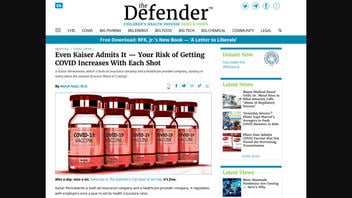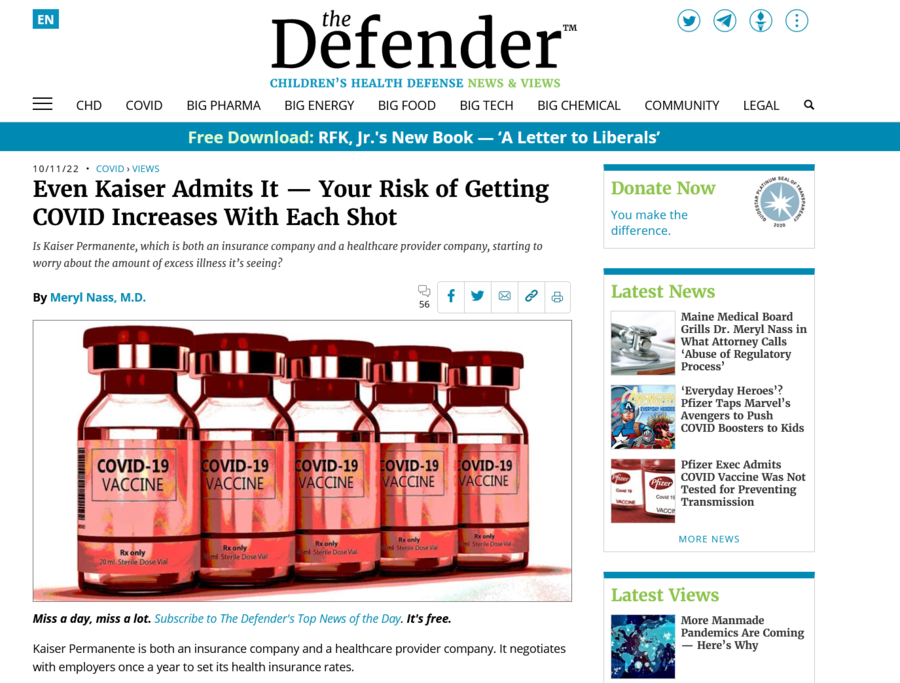Fact Check: Kaiser Did NOT State Risk Of COVID-19 Infection ‘Increases With Each Shot’

Did Kaiser Permanente, a major American non-profit healthcare provider, admit that the risk of COVID-19 infection “increases with each [vaccine] shot”? No, that’s not true. Lead Stories spoke with the lead author of the study, an assessment of the mRNA-1273 (Moderna) vaccine, that this claim targeted. He said that online commentators cherry-picked the study’s findings and twisted the results to misrepresent the effectiveness of the Moderna vaccine.
The claim emerged in a post published in the Conservative Review on October 4, 2022 (archived here). These claims were reposted on the self-publishing platform Substack on October 6, 2022 (archived here), and the website The Defender on October 11, 2022 (archived here). These three publications cited a review of the Moderna vaccine that was published in on medRxiv, which publishes preliminary medical studies.
Kaiser Permanente Southern California commissioned the study under a contract with Moderna, manufacturer of the eponymous COVID vaccine. Most of the authors work for Kaiser Permanente Southern California; one is an adjunct investigator for the non-profit, while two others are employees of Moderna, according to the study’s abstract.
Here is how The Defender post’s headline read:
Even Kaiser Admits It — Your Risk of Getting COVID Increases With Each Shot
This is how the article appeared at the time of this writing:
(Source: Screenshot of The Defender taken on Thurs Oct 13 06:48:33 2022 UTC )
The study in question tested how effectively the mRNA-1273 vaccine can ward off infection by Omicron subvariants of the COVID virus and prevent hospitalization. The research focused on 30,809 people who had tested positive for the virus and 92,427 people who had tested negative for the virus between January 1 and June 30, 2022.
Scientific experts have not yet rigorously reviewed this study.
Lead Stories contacted the study’s lead author, Dr. Hung Tseng, a senior scientist in the Kaiser Permanente Department of Research and Evaluation and a professor at the Kaiser Permanente Bernard J. Tyson School of Medicine. In an email sent on October 17, 2022, Tseng told Lead Stories that the risk of contracting COVID does not increase with each vaccine dose. Furthermore, the risk of COVID hospitalization and infection decreases with booster shots.
Tseng told Lead Stories that the research showed what other studies have demonstrated before — four doses of vaccine protect better than three, and three doses protect better than two. He summarized:
Your risk of contracting COVID does not increase because you have received the vaccine. However, regular boosters are necessary to continue the protection against infection and hospitalization provided by COVID-19 vaccinations. Also, we may be seeing that people who have been vaccinated and boosted participating in more risky public health behaviors such as gathering in crowded indoor areas and putting themselves at risk of infection after the vaccine protection has waned.
Below, we have addressed each of the prominent claims made in The Defender article based on Tseng’s responses:
•The risk of contracting COVID-19 does NOT increase after vaccination
The Defender article cited a table on page 30 of the study that shows the effectiveness of three doses of the mRNA-1273 vaccine and the comparative effectiveness of three versus two doses of the vaccine over time. The Defender claimed that, for four out of five Omicron subvariants, the table shows that, within five months of a vaccine shot, its effectiveness “had fallen into negative territory, and Kaiser’s thrice-vaccinated enrollees were more likely to get COVID-19 than the unvaccinated.”
Tseng told Lead Stories that this is not an accurate depiction of the study’s findings:
Your risk of contracting COVID does not increase because you have received the vaccine. However, regular boosters are necessary to continue the protection against infection and hospitalization provided by COVID-19 vaccinations. People who have been vaccinated and boosted likely participate in more risky public health behaviors such as gathering in crowded indoor areas, putting themselves at risk of infection after the vaccine protection has waned.
• You are NOT “screwed” five months after taking a COVID-19 vaccine
The Defender article also claimed that “efficacy drops quickly from the 14-30 days post-shot… lower at one to three months, lower still at three to five months and after that you are screwed.”
While the Moderna vaccine’s effectiveness against infection does wane over time, vaccines still protect against severe illness. Omicron variants of COVID, in particular, are especially good at “evading immunity,” which is why Tseng said that it is especially important that people receive their boosters.
It is also worth noting that Tseng and his team evaluated the original COVID-19 booster, which does not address Omicron variants. As of this writing, early data suggests that “bivalent” boosters, which tackle the two different Omicron variants as well as the original COVID-19 virus, are better equipped to protect against infection.
•Individuals with “three shots” are NOT “at more risk of COVID-19”
Exactly how much the Moderna vaccine’s effectiveness wanes over time depends on the risks that people take after being vaccinated. People likely change their behavior after being vaccinated, taking fewer precautions and putting themselves in situations with a higher risk of infection, added Tseng. Regardless, the Kaiser data showed that four doses do protect better than three.
“We believe, and the data has shown time and time again, that each booster dose adds protection against both infection and hospitalization,” Tseng told Lead Stories.
•Different COVID-19 subvariants DO have different “immunity-evading characteristics”
Rates of protection against COVID do differ between each dose of vaccine as well as depending on the subvariant of the virus and the length of time since the last vaccine shot. Subvariants evolve to develop different immunity-vading characteristics; ways to address these characteristics evolve as well, added Tseng.
Vaccine effectiveness against infection and hospitalization can be affected by all of these factors. Additionally, vaccine effectiveness wanes over time after vaccination. This is why you need periodic vaccine boosters to generate good-quality antibodies.
In addition, Tseng concluded that the new bivalent boosters are “expected to provide better protection against omicron BA4 and BA5 subvariants.”
Additional Lead Stories fact checks related to COVID-19 vaccines can be found here.



